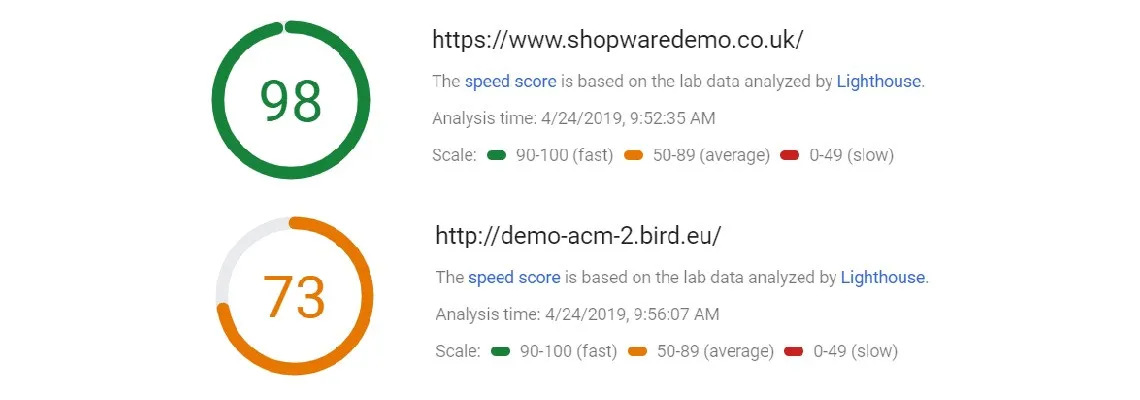

Do you want to better reach and serve your customers with a new web shop for your business? However, are you overwhelmed by the huge choice of e-commerce platforms? Logically! After all, every company is unique, with its own specific goals, structure and target audience. Therefore, every webshop today needs a customized solution.
In addition, the demands of online consumers are becoming increasingly complex. This makes it increasingly difficult for any online retailer to keep up with the competition and stand out. Choosing an ideal e-commerce platform is therefore not easy.
In this article, we compare two platforms that have a proven name in e-commerce: Magento 2 and Shopware 5. Both platforms have powerful software and offer extensive possibilities to perfect your webshop tailored to your customers. That's why at PHPro we always recommend one of these two e-commerce platforms, depending on your business model.
Below we list the main pros and cons of both platforms, ranging from popularity, ease of use, performance, SEO, extensibility (extensions/modules) and price.
How user-friendly is Magento versus Shopware?
Because of its numerous features and custom modules, Magento is a complex platform with a steep learning curve. Therefore, you need development to fully optimize Magento to your needs. For this reason, you better engage a third party, such as PHPro, who will configure the Magento shop 100% correctly and make it user-friendly.
Shopware, on the other hand, has a very user-friendly interface in which you can easily configure your website and integrate it with external applications. This makes Shopware very user-friendly for non-technical individuals without programming knowledge.



Performance of Magento and Shopware
An important factor in performance is page load time. According to a study by Google, 53% of mobile visitors leave a site when it takes more than 3 seconds to load.
So this means that it is important to have good performance on your e-commerce shop. Treolabs made a comparison and both standard sites had a good score on page speed. The Magento 2 website used got a score of 79% and the Shopware website got 87%.
In addition, we conducted our own page speed test on two demo sites of Magento and Shopware. Here Shopware (98) scored significantly better than Magento (73).
Of course, we have to take into account that these are only demo websites and that scores in practice also depend on factors such as hosting platform, number of products, ...
SEO for Magento and Shopware?
When we look at the SEO functionalities of both platforms, we can see that there are quite a lot of options available. According to a survey by ecommerce platforms on the SEO score of e-commerce platforms, it appears that Magento scores very high with a score of 95, making it a shared third place. Unfortunately, Shopware is not included in this survey.
The biggest difference between the two platforms is that many of Magento's advanced SEO functionalities have to be set up manually. With Shopware, the SEO functionalities are automatically configured and easily customizable.
Adding additional functionality to Magento and Shopware?
Both platforms allow users to develop modules or extensions for their platform. These extensions are offered or sold for free in the Magento and Shopware shops. As a result, the functionality of both platforms is extensive.
In addition, Shopware itself also offers extensions. Magento does this only in their Enterprise Edition.
Since Magento 2, installing and using modules has also become easier. With Magento 1, modules could create conflicts when they needed the same data. This problem has now been solved.
What is the price for Magento and Shopware?
Both Magento and Shopware offer a free community edition. Of course, this community edition does not have all the functionality of the paid version. The community edition is suitable for those who want to learn to work with the platform or for startups comparing software and platforms.
In addition to the community or open source version of Magento, they also offer the commerce version. For this you have to pay an annual license that costs a little over 17 000 euros.
Shopware is a bit more flexible in their pricing than Magento and offers several paid versions. The first version is the Shopware Professional which costs €999. This price includes 12 months of support and updates. On top of this option and the community version, you can buy premium extensions from Shopware.
The next option is the Shopware Professional Plus for €5 995. This version immediately includes all premium extensions. Then there is the Shopware Enterprise for which you request a custom quote.
Conclusion of Magento VS Shopware
Who will make it? David or Goliath? Both platforms are excellent choices as E-commerce platforms depending on your business model, goals and internal needs:
For small to medium-sized companies, who want to start an e-commerce shop, operate mainly in the home market and don't want to depend too much on development, we recommend Shopware. Shopware is cheaper, easier to set up and more user-friendly for marketers and shop managers who mainly want to offer visually inspiring shopping experiences.
For medium to large companies with an international target audience, a diverse product range and need for extensive settings for international taxes and duties, we recommend Magento. Magento is more complex and expensive, but you do get a robust and scalable platform that can handle huge amounts of data and traffic and is also 100% configurable and extensible to suit your business, given the necessary technical expertise.
For more information on e-commerce, marketing tips & tricks or other trivia, subscribe to our newsletter at the bottom of the page.
Are you looking for a technical and strategic partner to manage your e-commerce ambitions?
PHPro is a Magento Certified Partner and has been the Belgian reference for Magento projects for many years. Our partner Meteor is the Belgian reference for Shopware projects.
Contact us and we will set up your plan to digital success!